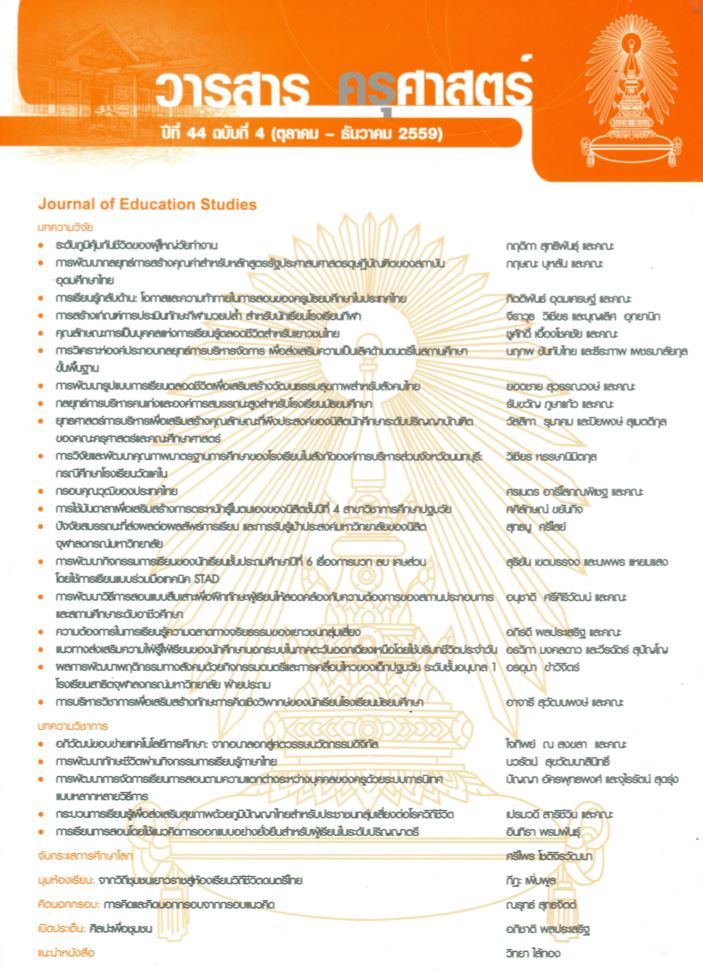แนวทางส่งเสริมความใฝ่รู้ใฝ่เรียนของนักศึกษานอกระบบในภาคตะวันออกเฉียงเหนือโดยใช้บริบทชีวิตประจำวัน
Keywords:
ความใฝ่รู้ใฝ่เรียน, การศึกษานอกระบบ, บริบทชีวิตประจำวัน, Curiosity, Non-formal Education, Daily-Life Context Learning.Abstract
การวิจัยเชิงสำรวจครั้งนี้มีวัตถุประสงค์ 1) เพื่อศึกษาระดับความใฝ่รู้ใฝ่เรียนตามการรับรู้ของผู้เรียน ผู้สอน และผู้บริหาร และ 2) เพื่อนำเสนอแนวทางการส่งเสริมความใฝ่รู้ใฝ่เรียนของนักศึกษานอกระบบโดยใช้บริบทชีวิตประจำวัน กลุ่มตัวอย่าง คือ นักศึกษานอกระบบในภาคตะวันออกเฉียงเหนือ จำนวน 400 คน ผู้สอนนักศึกษานอกระบบ จำนวน 40 คน และผู้บริหารจากศูนย์การศึกษานอกระบบและการศึกษาตามอัธยาศัยระดับอำเภอจำนวน 20 คน เครื่องมือที่ใช้ในการวิจัยประกอบด้วยแบบสอบถาม แบบสัมภาษณ์ และการสนทนากลุ่ม (focus group) สถิติที่ใช้วิเคราะห์ข้อมูลเชิงปริมาณ ได้แก่ ค่าเฉลี่ย และส่วนเบี่ยงเบนมาตรฐาน วิเคราะห์ข้อมูลเชิงคุณภาพด้วยการวิเคราะห์เนื้อหา
ผลการวิจัยพบว่า ระดับความใฝ่รู้ใฝ่เรียนของนักศึกษานอกระบบตามการรับรู้ของผู้เรียนอยู่ในระดับมาก โดยด้านวิชาการมีค่าเฉลี่ยสูงที่สุด ผู้สอนนักศึกษานอกระบบและผู้บริหารต่างเห็นตรงกันว่าความใฝ่รู้ใฝ่เรียนของนักศึกษานอกระบบอยู่ในระดับปานกลาง โดยแสดงพฤติกรรมความใฝ่รู้ใฝ่เรียนด้านวิชาการมากที่สุด แนวทางส่งเสริมความใฝ่รู้ใฝ่เรียนของนักศึกษานอกระบบโดยใช้บริบทชีวิตประจำวัน ประกอบด้วย หลักการของการคิดเป็น วิธีการในการส่งเสริม ได้แก่ การทำเรื่องง่ายให้อยากทำ กิจกรรมในการส่งเสริมความใฝ่รู้ใฝ่เรียนประกอบด้วยกิจกรรมที่เกี่ยวข้องกับครอบครัว วิชาการ อาชีพ และสังคมของนักศึกษานอกระบบ ผู้สอนนักศึกษานอกระบบและผู้บริหาร ควรส่งเสริมและจัดการเรียนการสอนให้เชื่อมโยงกับเหตุการณ์ในชีวิตของผู้เรียน เพื่อให้นักศึกษาสามารถนำไปใช้ในชีวิตประจำวันได้ นอกจากนั้นควรให้ความสำคัญกับการส่งเสริมให้นักศึกษาเป็นผู้ที่มีความกล้าแสดงออกในด้านต่างๆ
The objectives of this survey research were: 1) to study the levels of learning curiosity among students, instructors and administrators based on their perceptions, and 2) to propose guidelines for enhancing learning curiosity of non-formal students using daily-life context. R
The research sample were 400 students in the Northeastern region of Thailand; 40 instructors in in Northeastern region of Thailand; and 20 administrators from district centers of the non-formal and informal education. The instruments for data collection consisted of questionnaires, interview schedules, and a focus group discussion. Statistics used for quantitative data analysis included mean and standard deviation. The qualitative data were analyzed by means of the content analysis.
It was found that the level of learning curiosity among non-formal students based on their perception were high in all aspects. The area that gained the highest mean was that of academic. Both the instructors and administrators agreed that learning curiosity among non-formal students was at a moderate level, primarily in the academic area. Guidelines for enhancing the learning curiosity of non-formal students using daily-life context consisted of the ‘KITPEN’ principle, the simplification method, activities related to family, professions, occupations and the society of students, and instructors’ and administrators’ roles in promoting and organizing teaching linked to students’ living situations which was seen as being applicable to their daily life. In addition, encouraging students to be confident in expressing themselves in various areas was to be emphasized.




